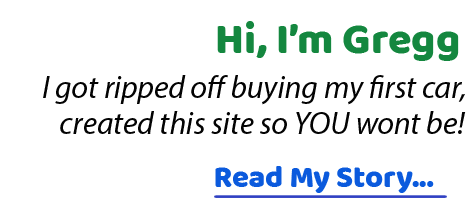Step 3. Get the Most for Your Trade-In
Most new car buyers have a used car they need to get rid of. You generally have three options - you can either trade it in at a dealer, sell it yourself to a private party, or do a hassle free trade to used car marketplaces such as Carvana, or CarMax.
I recommend selling to a private party if you want to maximize savings, particularly on older or higher mileage vehicles (dealers are more likely to send these to wholesale auction if you trade with them). Yes, there are some hassles, but it's usually worth the extra savings. (However, in recent times, the used car marketplaces can be competitive with private party offers - in fact, I sold my last used car this way and got a better price than I was offered via private party)
Dealerships make more money selling used cars than they do new cars. Just look at the difference between retail and wholesale prices in any popular pricing guide and you'll see it's huge. Consumers are so caught up with "haggling" over the new car price, they get blindsided by the trade-in. It's amazing how many people consider the trade-in an afterthought, leaving thousands of dollars on the table.
If you're thinking about trading-in, you need to seperate that transaction from the purchase of the new car. If you combine them, the dealer has a lot of room to play around with the numbers. They may offer a good deal on your trade-in, but rip you off on the new car, or vice-versa. Bottom line: You still end up with a bad deal.
If You Still Insist On Trading-In...
Despite my recommendation, if you still insist on trading-in your old car at a dealership, you should complete the following steps to get the most money in your pocket.
1. Learn Ballpark Value
When trying to figure out the trade-in value of their used car, most people just look up the price on KBB and consider it a done deal. But that's a big mistake. These pricing guides can be off by thousands of dollars depending on the condition of your car, the location, and time of year (and especially nowadays with all the supply chain issues). For example, 4-wheel drive vehicles are in higher demand during the winter. Convertibles are higher in demand in sunny locations. If you check 3 different pricing guides, you'll get 3 different prices.Knowing this, you will use these pricing guides only as a ballpark figure. Factor in a possible range of plus or minus 25% for whatever the pricing guides state. For example, if the guide says your car is worth $10,000, the ballpark range is really $7,500 to $12,500.
One thing I always check to get an idea of prices in my area is CarGurus. I like their classified listings best, you can usually get a good idea of what your car is selling for on dealer lots - make sure you limit your search location within 200 miles of your zip so you get an accurate assesment of prices in your region.
2. Clean and Wash
Before you trade-in your old car, make sure you're not short-changing yourself. Be sure to clean the car thoroughly inside and out. First impressions do make a big difference. Gather all your maintenance records in one place. Change the oil and filter if needed. Replace broken lights. Fix anything that you can. If you have minor surface damage, such as paint scratches or chips, it's best to try to touch them up. Don't repaint your vehicle - most buyers will think it's been in an accident.
3. Get Offers from at Least 3 Dealerships
This step is where you'll be maximizing savings. To get the true wholesale value of your car, you need to get multiple offers. Assuming you have a car that is fairly new (5 years or newer) with less than 75,000 miles, you need to get offers from at least 3 dealerships.
But not just any dealership. Make sure to go to a dealership selling the same nameplate as your car. So if you're wanting to sell a Toyota, contact Toyota dealerships. This is important because they'll generally offer you a better price than an unrelated dealer. This is because people tend to shop by nameplate. Someone going into a Toyota dealership is more likely to buy a used Toyota rather than a different nameplate. The dealer can offer you a better price because they'll be selling your car on their used lot instead of having to sell it for wholesale to another dealer.
This is important because they'll generally offer you a better price than an unrelated dealer. This is because people tend to shop by nameplate. Someone going into a Toyota dealership is more likely to buy a used Toyota rather than a different nameplate. The dealer can offer you a better price because they'll be selling your car on their used lot instead of having to sell it for wholesale to another dealer.
To get offers, first call nearby dealerships and ask to speak to the person who buys used cars. Tell them the year, make and model you're selling and let them know the car has been well maintained. Ask if they would be interested in seeing it. If not, you've saved yourself a time-consuming trip. If yes, tell them you'll be over there within a couple of hours. Repeat this process until you have 3 dealerships interested in seeing the car. Unfortunately, if you live somewhere that doesn't have many dealerships, try calling dealerships that compete closely with your nameplate (example: Toyota and Honda). You won't get as good a deal, but it's still worth getting offers, and don't forget about used car superstores such as CarMax - they're always interested in purchasing used cars.
When you get to the dealership, ask to see the person you spoke with. They will take a look at your car and come back with a price (usually a low-ball offer). No matter what price they quote, tell them the offer seems low compared to what you've been quoted elsewhere. They will either say that's the final offer or will ask what price you've been offered elsewhere.
Whatever price they first quote, come back with a price about 15% higher. So if they quote you $10,000, say that you believe the car is worth at least $1,500 more. Wait for their response. If they say "no way", ask if that means the first offer was their best offer. If they say "that's too high", ask them how much higher. Chances are, they will offer you a higher price.
You're not done yet. Tell them the car is in great shape and won't result in any problems. Counter with a price halfway between their last offer and your original counter-offer. Say you think the car should be worth that much and see how they respond. Either way, when you're done, you will have a good idea as to what your car is really worth. Repeat this process until you get offers from 3 different dealerships.
For Older or High Mileage Cars:
If your car is over 5 years old or has over 75,000 miles, chances are a new car dealer will not put that car for sale on their lot. Instead, they'll just sell it at wholesale price either to an independent used car dealer or at an auction. So if you trade in your car, the dealer will just act as a middleman and pocket some profit at your expense. In this case, you should shop your car to used car dealers directly. Go through the same process above - just with independent used car dealers.
4. Compare Offers When Buying Your New Car
Now that you've gotten several offers, you have an excellent idea on what your trade-in is really worth. You can use this information to your advantage when buying your new car.Most dealers will ask if you want to trade-in. They're hoping you're a sucker who won't realize they're making a killing off your used car. During the car buying process, you can say you have a trade-in, but that you want to negotiate the price of the new car first. After you have done so, you can see if they can beat the prices you've gotten from other dealers.
If they can beat it, great! If not, that doesn't mean you should stop there. First, find out beforehand if your state offers tax advantages for trade-ins. If so, you're allowed to deduct your trade-in value from the purchase price of the new vehicle. If your new car costs $25,000 and your trade-in is worth $10,000, you pay taxes only on $15,000. If your state charges a tax of 7%, that's a $700 savings. So make sure you take that into account. In the example above, if the dealer you're purchasing from offers you anything above $9,300 and the best offer you got elsewhere was $10,000, you would still save more by selling to the dealer.




